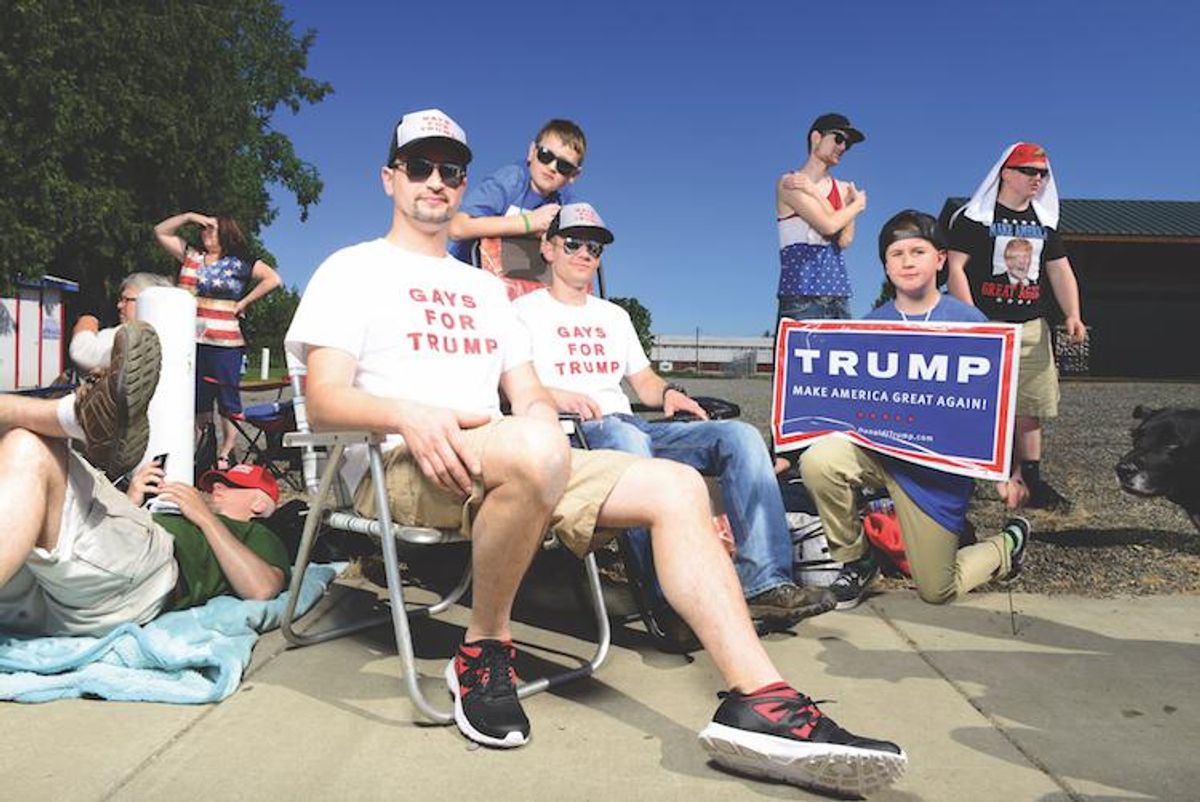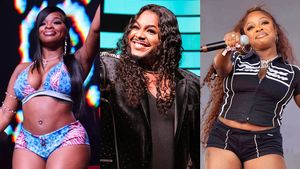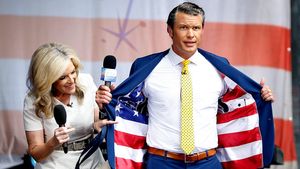After the shooting at Pulse nightclub in Orlando, Donald J. Trump quickly tried to capitalize on the tragedy, using a speech to promote his LGBT credentials. "Ask the gays," he said. "Who's your friend, Donald Trump or Hillary Clinton?" Gay Twitter sparkled into action.
"If you hadn't lost us at your racism, bigotry or elitism you would have lost us with that hair...," tweeted one user.
"#AskTheGays how to blend your damn foundation," wrote another.
A storm of GIFs made the rounds, one featuring Mariah Carey quipping a smug "I don't know her." Another showed a Real Housewives cast member running in terror from a restaurant screaming, "Get her away from me!"
But for a tiny, embattled group of LGBT Trump supporters--a minority within a minority within a minority--the flip-flopping New York businessman's past support for gay rights has a redeeming quality they did not find in his Republican rivals, or even, it seems, in his opponent, Hillary Clinton. Their love for Trump has not won them friends in the wider gay community. Most prominently, Caitlyn Jenner, an outspoken supporter of Trump, attended the Republican National Convention in Cleveland to lend her support. "It was easy to come out as trans," she told a gathering there. "It was harder for me to come out as Republican."
For Kyle Kittleson, a young gay Republican who believes Trump has a better LGBT record than Clinton, the issue is about respecting other opinions. "Independent of whom I'm voting for, we should have the right to say that without getting a death threat," he says. "You can disagree with me. You shouldn't threaten to kill my dog." Lean and preppy-handsome, he's got a touch of young Jeff Goldblum in a checkered button-up shirt and jeans. He's pretty much exactly how many of us might picture a gay Trump supporter.
Last October, with the Republican primary in full force, Kittleson caused a stir with a video he posted to YouTube announcing his support for Trump and explaining why the gay community should embrace Trump supporters like him. In it, he says, "I have a lot--a lot--of gay friends who totally support Trump but won't support him publicly. Why? Because they're literally afraid they'll lose their clients, their friends, and their gay card." Appearances on Fox News quickly followed.
The track record Kittleson refers to is Trump's statement on August 16, 2015, on NBC's Meet the Press that sexual orientation shouldn't be a reason to be fired. He also told The Advocate in 2000, "Amending the Civil Rights Act would grant the same protection to gay people that we give to other Americans--it's only fair," and that he supported a "very strong domestic-partnership law." Since the North Carolina restroom law, he's been an occasional supporter of transgender restroom rights.
But much of that professed commitment is in conflict with Trump's outreach to evangelical voters, as well as his selection of anti-LGBT Indiana governor Mike Pence as his vice presidential running mate. Among other onslaughts against the LGBT community, Pence signed into law Indiana's so-called religious freedom restoration act last spring, making discrimination against LGBTs legal under the cloak of religion.
Even the Log Cabin Republicans, the nation's largest LGBT Republican organization, on message with the party establishment, isn't all in for Trump. After the party's platform was made public, the heartbroken Log Cabin Republicans sent out a newsletter.
"There's no way to sugar-coat this: I'm mad as hell," wrote Gregory T. Angelo, president of the organization. "This isn't my GOP, and I know it's not yours either. Heck, it's not even Donald Trump's!"
During the convention, the Log Cabin Republicans took out a full-page ad in USA Today, the nation's largest newspaper, dominated by the words "Losers! Morons! Sad!" in large bold font to express their dismay with the party that refuses to love them back.
"Because of the ad, hundreds of people made a point of pulling me aside at the convention saying that the party platform doesn't represent them," Angelo says. "That's the GOP I know."
On day two of the convention, a Gays for Trump rally was held in a ballroom decorated with portraits of excessively young, lithe, nearly nude, white twinks in "Make America Great Again" baseball hats. Addressing the crowd were Islamophobic blogger Pam Geller and Milo Yiannopoulos, the tech editor of Breitbart who was most recently in the news after getting banned from Twitter for inciting racist abuse ofGhostbusters star Leslie Jones.
On the final night in Cleveland, in his fear-stoking speech, while listing several recent mass murders in the United States that may or may not have had much to do with ISIS, Trump invoked the Orlando massacre both to further his anti-Muslim agenda and to burnish his credentials with the LGBT community.

"I will do everything in my power to protect our LGBTQ citizens from the violence and oppression of a hateful foreign ideology," he said to muted cheers. "And I have to say, as a Republican, it is so nice to hear you cheering for what I just said." It was uncanny, not simply to hear the GOP presidential candidate saying "LGBTQ," but to hear it in the context of the adoption of the most viciously anti-LGBT platform in the party's history. Trump himself may not embrace that platform, but neither does he embrace marriage equality.
There can be no bigger gay Trump supporter than PayPal cofounder Peter Thiel, who addressed the crowd at the RNC. A libertarian who has invested in life-extension science and established a fund to pay students $100,000 to drop out of college and start their own businesses, he told the audience, "I am proud to be gay.... I am proud to be an American." It was an extraordinary moment, no matter your political outlook, and it's that kind of gut instinct of Trump's--to invite a man like Thiel to address the convention--that resonates with many people. It may be hollow and insincere, but it's unlikely, even unthinkable, that any of the other Republican nominees would have gone there.
Charles Moran, a Trump delegate at the Republican National Convention, admits that it's sometimes difficult to understand what Trump actually believes, but he also thinks the vitriol targeted at queer Republicans who support the nominee has gotten excessive.
"The righteous indignation basically slut-shames people for supporting Trump," Moran says of the reaction from some liberals. Tall and thick with blond hair and a deep, enunciated voice, Moran is a longtime Republican fundraiser and event planner. We met at a coffee shop in Los Feliz, a liberal neighborhood east of Hollywood.
Moran's gay friends have learned over the years to overlook his contrarian views, but some, he says, have come on board for Trump. One couple he knows well--white, upper-middle-class, "new landowners"--recently told Moran that they were supporting Trump because they can't bring themselves to vote for Hillary Clinton. Moran feels that "[Trump's] level of authenticity is what's driving people to him."
"He's a successful person. I feel he possesses the character and personality traits that will make a strong president... He didn't walk in and make a certain set of promises, and then not keep them," Moran says. (It goes without saying that Trump has not yet had an opportunity to show whether he can keep his promises, which, for now, are little more than elaborations on "Make America Great Again.")
Given that the official 2016 Republican Party platform includes overturning the Supreme Court's marriage decision with a constitutional amendment, appointing federal judges who support "traditional family values," and promoting state laws that limit transgender choice of restroom use, even giving a nod to "conversion therapy," it's clear that there's an obvious contradiction between Trump's history of supporting LGBT rights and the stance of the party base.
"The party platform is something he won't stick to," Moran says in Trump's defense. "He's said from day one, he's his own person."
In the center of Washington, D.C., just a few blocks from the White House, I visit the headquarters of the Log Cabin Republicans in a nondescript office building shared with a large telecommunications firm. I tell the receptionist I am there for the Log Cabin Republicans.
"Who?" she asks abruptly.
Eventually Angelo, the current president, tall and dapper with large eyes and wavy blond hair, comes to meet me. Although he doesn't provide a number of how many Log Cabin folks are out there, he boasts a "database" of more than 40,000 people. After an awkward elevator ride, Angelo leads me through a dark maze of hallways into what feels like the backdoor to a much larger office.
"Excuse the mess," he says.
Inside, the decor is Reagan-inspired: American flags, pictures of Reagan, a bust of Reagan, basically everything except Reagan's famous jelly beans, because carbs.
"If you look exclusively through the prism of LGBT civil rights, Donald Trump is the best Republican nominee for president we've ever had," Angelo says, putting on his game face. "But that involves putting everything else aside with Donald Trump. And that is a Herculean, if not impossible, task."
Kittleson has a theory that Trump's xenophobia is merely a cover to win election. "He needed to get the support of the crazy right-wingers," Kittleson says. "I wish he would shut the fuck up. I think it's rude; I think it's awful. But he finds it necessary, I believe."
But Kittleson might not expect to get much love on either side of the aisle--or the rainbow--this election cycle.
"The gay community has been the most surprisingly hateful towards me," says Kittleson. "[On YouTube] it was like I posted a video of me killing a puppy. They feel I'm a self-loathing homosexual."
As for Angelo, he refuses to say whom he plans to vote for in November.
"I never reveal whom I vote for," he says. "That's our right as Americans."
Like what you see here? Subscribe and be the first to receive the latest issue of Out. Subscribe to print here and receive a complimentary digital subscription.



















































































